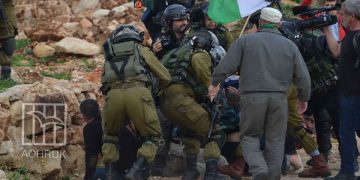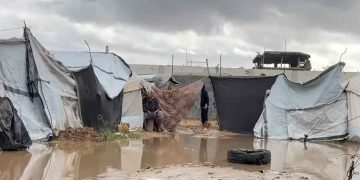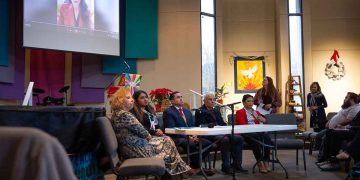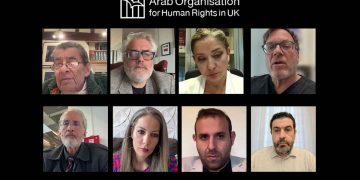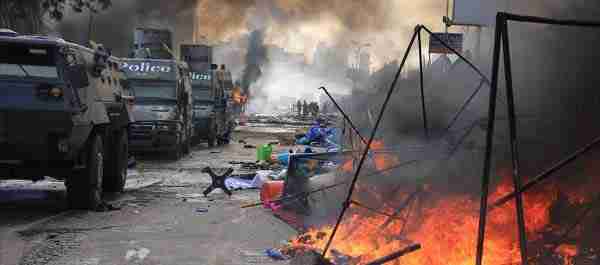The silence of the international community on the massacre encouraged the regime to commit further massacres
Yesterday marks the sixth anniversary of the massacres of Rabaa Al-Adawiya, Al-Nahda Square and a number of other squares in Egyptian governorates, which took place on 14 August; perpetrators of this horrendous crimes enjoy full impunity, while the victims and their families face severe punishments amounting to death penalty and life sentences.
Following 03 July 2013, Egyptian security forces committed the largest mass murder in modern Egyptian history. They dispersed the sit-ins of the Egyptian opposition activists, which resulted in the brutal killing and injury of more than 1100 people, including women and children. Thousands of people were injured and arrested, and at least 37 people are still missing and their fate has not been revealed, nor were they enabled to communicate with their families.
According to testemonies, videos, official medical reports and burial permits; the number of dead and the nature of injuries in the bodies of the injured the dead (most of it in the head and heart) shows a deliberate intention to kill the protesters during the dispersal of the sit-ins, and not evacuate the squares peacefully as claimed by the Egyptian media at the time.
The decision to commit the massacre came after wide incitement campaigns by the Egyptian media; visual, print and audio. The pro-government media demonized the protesters and labelled them as terrorists. This was in line with official statements made by Egyptian officials, in order to pave the way for this crime to talk place and to prevent any public outrage from resulting.
The Egyptian judiciary participated directly in this crime, and has until this moment refrained from initiating any criminal proceedings or judicial investigation into any of the mass killings since July 2013.
It has also issued the dispersal resolution on 31 July 2013 by former Egyptian Attorney General Hisham Barakat, hours after the Egyptian Ministry of Interior filed a request for the dispersal.
Six years after the crime, all attempts made by the victims or their families to obtain legal remedies have failed. No local or international body has seriously investigated this crime and not a single person from the security forces who have been responsible for the killing of hundreds of civilians was charged. On the contrary, the protesters who faced arbitrarily detention were charged with killing their co-protestors in the sit-in in case No. 34150 of 2015. This first felony case had 739 defendants from the protesters according to the referral order. After nearly five years of trial, 75 of them were referred to the Grand Mufti on July 28 2018 for his opinion on their execution.
On 08 September 2018, 75 people were sentenced to death, 47 to life imprisonment (most notably Muslim Brotherhood leader Mohamed Badie), 374 defendants sentenced to 15 years and 215 others to five years imprisonment, including photojournalist Mahmoud Abu Zeid, known as “Shawkan”.
In light of the collapse and the lack of the Egyptian justice system impartiality and the corruption of legislations, the accountability of the perpetrators of this massacre remains very difficult to achieve. The Egyptian Penal Code does not allow the victims or their families to file cases by themselves, and no legal action can take place except through the Public Prosecution, which turned into a repressive tool at the hands of the regime, just like the police and the army who are used to brutalize dissidents. Thousands of arrest warrants and ongoing imprisonment without any legal justification are taking place against civilians from the opposition, while full protection and impunity are granted to security forces and its leaderships who have been involved in committing these massacres.
In order to silence the international demands to investigate these crimes, the Egyptian system formed two local commissions to investigate the events (one by the National Council for Human Rights – a quasi-governmental institution – and the other formed by presidential decree to investigate the events); however, after the issuance of the reports of the two committees, it was clear that the committees were only formed clear the crimes of the regime and to silence domestic and international demands to prosecute those responsible. This in return provided further impunity for the real perpetrators since both reports held the protesters responsible for these crimes, while police violations were limited to administrative and procedural errors according to the reports.
For six years, the United Nations has failed to take any action to investigate this crime, international demands to open an investigation into these events have gradually diminished and relations with the Egyptian regime came back to normal despite its policy of committing ongoing crimes and despite the seriousness of this crime.
International silence has enabled those responsible for this massacre to go unpunished and encouraged them to commit more crimes that have not ceased since July 3 to this day in order to crush the opposition and silence any voice calling for change or reform.
The massacre of Rabaa Al-Adaweya and Al-Nahda and the subsequent mass killings and arbitrary arrests are a disgrace to the international community, which has been silent when silence was forbidden and has not taken the necessary action to achieve justice or deter this system from shedding the blood of the Egyptians under the claims of counter-terrorism.
Arab Organization for Human Rights in the UK (AOHR UK) calls on all civil society organizations around the world to impose pressure on their governments in order to take serious positions against this regime, which has committed the most serious crimes and its perpetrators continue to go unpunished.
AOHR UK reiterates its call on the Secretary-General of the United Nations to set up a full-fledged fact-finding commission to uncover the crimes committed in Egypt following 3 July 2013 and to bring those responsible to justice.


